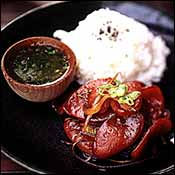
Once, the word tapas referred strictly to a single cuisine (Spanish) and a singularly illustrious, sherry-soaked tradition involving slabs of potato-and-onion tortilla and boquerones slicked with olive oil. Now that it’s been appropriated by virtually every other culture, or at least their menu writers, tapas has come to mean one thing in lots of different languages: small plates at equally small prices. The penny-pinching gourmet (and aren’t we all these days?) can make a satisfying meal of so-called French tapas (heretofore known as hors d’oeuvre), Italian tapas (chichetti), or Turkish tapas (meze). Or for something delightfully different, he can walk up a narrow flight of stairs into the unexpectedly welcoming premises of Kuma Inn and discover what tapas means to a Thai-Filipino New Yorker who cooked for Bouley and Boulud before rediscovering his culinary roots.
King Phojanakong opened Kuma Inn four months ago, and its obscure Lower East Side location and narrow specialization—plus a $10 price ceiling—have made it a true destination restaurant. Small and unfussy, with an open kitchen and an artful, bamboo-accented décor, Kuma feels like a cross between a sake speakeasy and an Asian Cheers, where the smiling waitress remembers what you drank last time (one of nineteen rice wines, probably, or a floral, refreshing Australian white), and the chef stops by each table to gauge reactions.
The only customers he need worry about are the flavor-phobic. Phojanakong’s dishes—elegant presentations that arrive one by one, in no particular order—are boldly seasoned, tart and piquant or reeking delectably of garlic, melding the flavors of Chinese, Thai, and Philippine food with refreshing vigor. The trio of pickled-vegetable salads is all vinegary bite. Tender pork shumai have a nice pop of wasabi kneaded into the dough, and vegetarian summer rolls crunch with freshness and resonate with Thai basil.
Those who compulsively grab for the hot sauce at every meal will love the viscous made-to-order green chili that accompanies Chinese sausage with sticky rice, Phojanakong’s take on a typical Philippine breakfast dish minus the eggs. The condiment, his Thai father’s recipe, looks deceptively like an innocent pickle relish but loudly echoes the mildly sweet and strong, garlicky flavor of the pork sausage; likewise, the chewy texture of sticky rice studded with black sesame seeds matches the texture of the almost jerky-like sausage.
That pungent sausage shows up again, folded with scallions and bean sprouts into a pancake-style omelette—Kuma’s version of salami and eggs. Pork tonkatsu, breaded with panko and fried to an ideal crispness in brown butter, harks back to the chef’s schnitzel- sizzling days at Danube.
The kitchen’s knack for seafood is delectably revealed in the perfectly cooked smallish hunk of salmon, balanced on a coil of long beans and enhanced by a sweet-and-salty mirin-soy glaze. (A pale-green foam, though, is uncharacteristically devoid of flavor.) The chef uses crumbled bacon and a hit of citric kalamansi juice and sake to season sweet and creamy scallops, and a small, perfectly rare tuna steak needs nothing more than a touch of ginger-soy.
Simple sautéed mustard greens or meaty, earthy mushrooms with baby bamboo shoots pack much more of a punch than the assortment of bland “stix,” grilled skewers of meat or vegetables with acute marinade deficiency. But for every (rare) clunker, there’s a daily special to keep things interesting: a meaty grilled pork chop, for instance, with Vietnamese-style noodles, or fresh shrimp sautéed in butter and kalamansi juice. Kuma Inn takes the tapas concept someplace new, with big flavors and even bigger ideas about how to combine them. Only the plates are small.
Kuma Inn, 113 Ludlow Street, second floor (212-353-8866). Tuesday through Sunday, 6 p.m. to midnight. Small plates, $5 to $10. Cash only.